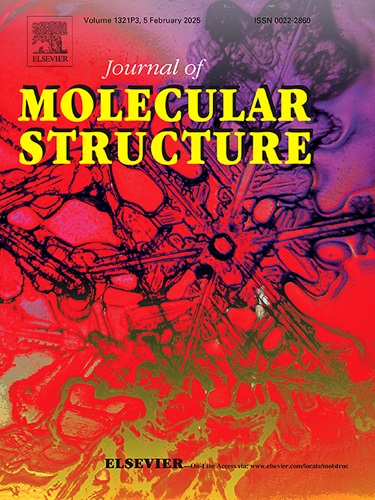TiO2/ZnWO3 with improved photocatalytic performance in the preparation of chromeno[4,3-b]chromenes, as cardiovascular drugs
IF 4
2区 化学
Q2 CHEMISTRY, PHYSICAL
引用次数: 0
Abstract
Chromeno[4,3-b]chromenes have shown potential as effective drugs against cardiovascular diseases, primarily due to their diverse biological activities, including anti-inflammatory and antioxidant properties. This study was conducted on a new heterojunction nanocomposite TiO2/ZnWO3 consisting of titanium dioxide (TiO2) and zinc tungstate (ZnWO3) with enhanced photocatalytic capability. TiO2/ZnWO3 nanophotocatalyst is characterized by FT-IR, XRD, DRS, SEM, and EDX and performed as an efficient nanophotocatalyst in the synthesis of chromeno[4,3-b]chromene derivatives. The research focused on the intricate interplay of the components, aiming to optimize the catalytic reactions under green-light irradiation. Through this investigation, insights were gained into the mechanistic pathways and the potential for improved yields in the formation of the desired chromene. TiO2 has the ability to absorb light and produce electrons and holes when exposed to the direct light; but to increase its photocatalytic activity, an additional component ZnWO3 is combined. Effect of photocatalyst amount, reaction time, temperature, and solvent as well as reusability of the nanocomposite are investigated. The research focused on the intricate interplay of the components, aiming to optimize the catalytic reactions under green-light irradiation. Through this investigation, insights were gained into the mechanistic pathways and the potential for improved yields in the formation of the desired chromene. TiO2 has the ability to absorb light and produce electrons and holes when exposed to the direct light; but to increase its photocatalytic activity, an additional component ZnWO3 is combined. Effect of photocatalyst amount, reaction time, temperature, and solvent as well as reusability of the nanocomposite are investigated.

在制备作为心血管药物的色烯并[4,3-b]色烯过程中具有更好光催化性能的 TiO2/ZnWO3
色烯并[4,3-b]色烯具有多种生物活性,包括抗炎和抗氧化特性,因此有望成为防治心血管疾病的有效药物。本研究对一种新型异质结纳米复合材料 TiO2/ZnWO3 进行了研究,该复合材料由二氧化钛(TiO2)和钨酸锌(ZnWO3)组成,具有更强的光催化能力。通过傅立叶变换红外光谱(FT-IR)、XRD、DRS、SEM 和 EDX 对 TiO2/ZnWO3 纳米光催化剂进行了表征,并将其作为一种高效的纳米光催化剂用于合成色烯并[4,3-b]色烯衍生物。研究的重点是各组分之间错综复杂的相互作用,旨在优化绿光照射下的催化反应。通过这项研究,我们深入了解了形成所需铬烯的机理途径和提高产量的潜力。TiO2 具有吸收光并在直射光下产生电子和空穴的能力;但为了提高其光催化活性,还需要结合一种额外的成分 ZnWO3。研究了光催化剂用量、反应时间、温度和溶剂的影响以及纳米复合材料的可重复使用性。研究的重点是各组分之间错综复杂的相互作用,旨在优化绿光照射下的催化反应。通过这项研究,我们深入了解了形成所需色烯烃的机理途径和提高产量的潜力。TiO2 具有吸收光并在直射光下产生电子和空穴的能力;但为了提高其光催化活性,还需要结合一种额外的成分 ZnWO3。研究了光催化剂用量、反应时间、温度和溶剂的影响以及纳米复合材料的可重复使用性。
本文章由计算机程序翻译,如有差异,请以英文原文为准。
求助全文
约1分钟内获得全文
求助全文
来源期刊

Journal of Molecular Structure
化学-物理化学
CiteScore
7.10
自引率
15.80%
发文量
2384
审稿时长
45 days
期刊介绍:
The Journal of Molecular Structure is dedicated to the publication of full-length articles and review papers, providing important new structural information on all types of chemical species including:
• Stable and unstable molecules in all types of environments (vapour, molecular beam, liquid, solution, liquid crystal, solid state, matrix-isolated, surface-absorbed etc.)
• Chemical intermediates
• Molecules in excited states
• Biological molecules
• Polymers.
The methods used may include any combination of spectroscopic and non-spectroscopic techniques, for example:
• Infrared spectroscopy (mid, far, near)
• Raman spectroscopy and non-linear Raman methods (CARS, etc.)
• Electronic absorption spectroscopy
• Optical rotatory dispersion and circular dichroism
• Fluorescence and phosphorescence techniques
• Electron spectroscopies (PES, XPS), EXAFS, etc.
• Microwave spectroscopy
• Electron diffraction
• NMR and ESR spectroscopies
• Mössbauer spectroscopy
• X-ray crystallography
• Charge Density Analyses
• Computational Studies (supplementing experimental methods)
We encourage publications combining theoretical and experimental approaches. The structural insights gained by the studies should be correlated with the properties, activity and/ or reactivity of the molecule under investigation and the relevance of this molecule and its implications should be discussed.
 求助内容:
求助内容: 应助结果提醒方式:
应助结果提醒方式:


